Essay on International Business: Environmental Aspects and India
VerifiedAdded on 2020/01/23
|7
|1701
|107
Essay
AI Summary
This essay delves into the environmental aspects of international business, examining socio-cultural, political, financial, and economic factors that influence global trade and investment. The essay explores the advantages of international business, such as optimal resource utilization and market expansion, while also analyzing the impact of globalization. The report focuses on the BRICS countries, highlighting India as a developing economy with significant growth opportunities. It critically discusses barriers to foreign investment, considering political, economic, socio-cultural, and financial contexts, and how these factors affect international business operations and investment decisions. The analysis includes specific examples and data related to India's economic landscape, policies, and growth potential, providing a comprehensive overview of the challenges and opportunities in the international business environment.
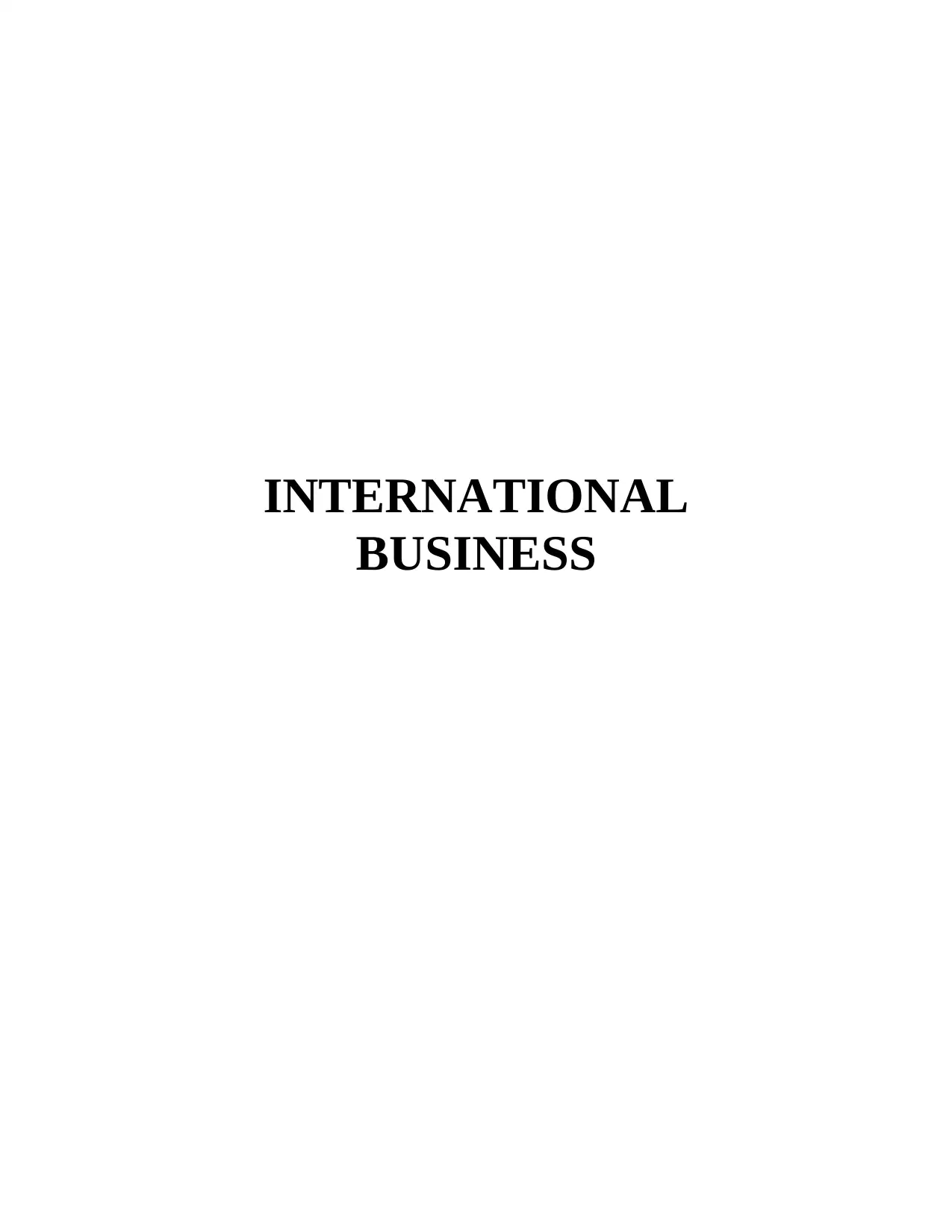
INTERNATIONAL
BUSINESS
BUSINESS
Paraphrase This Document
Need a fresh take? Get an instant paraphrase of this document with our AI Paraphraser
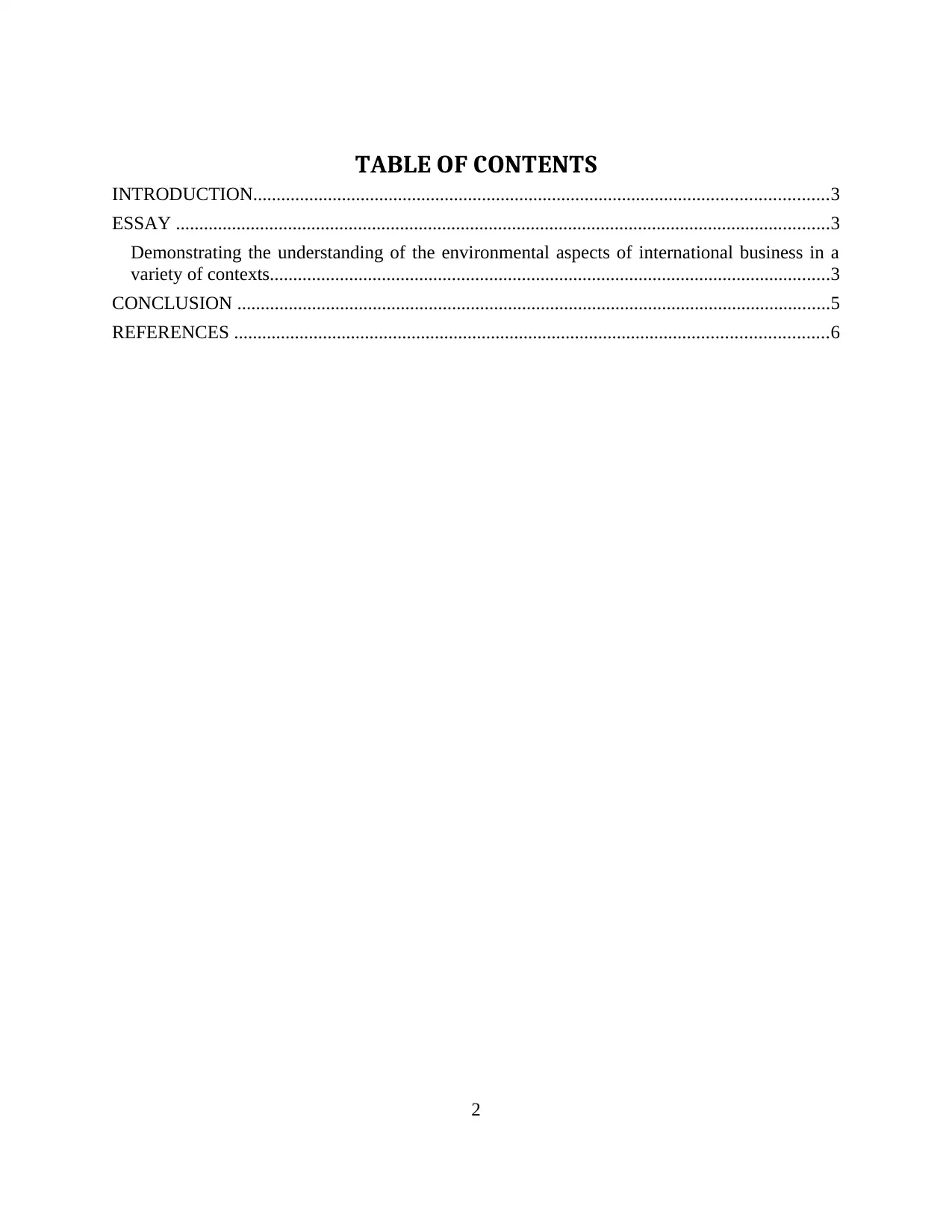
TABLE OF CONTENTS
INTRODUCTION...........................................................................................................................3
ESSAY ............................................................................................................................................3
Demonstrating the understanding of the environmental aspects of international business in a
variety of contexts........................................................................................................................3
CONCLUSION ...............................................................................................................................5
REFERENCES ...............................................................................................................................6
2
INTRODUCTION...........................................................................................................................3
ESSAY ............................................................................................................................................3
Demonstrating the understanding of the environmental aspects of international business in a
variety of contexts........................................................................................................................3
CONCLUSION ...............................................................................................................................5
REFERENCES ...............................................................................................................................6
2
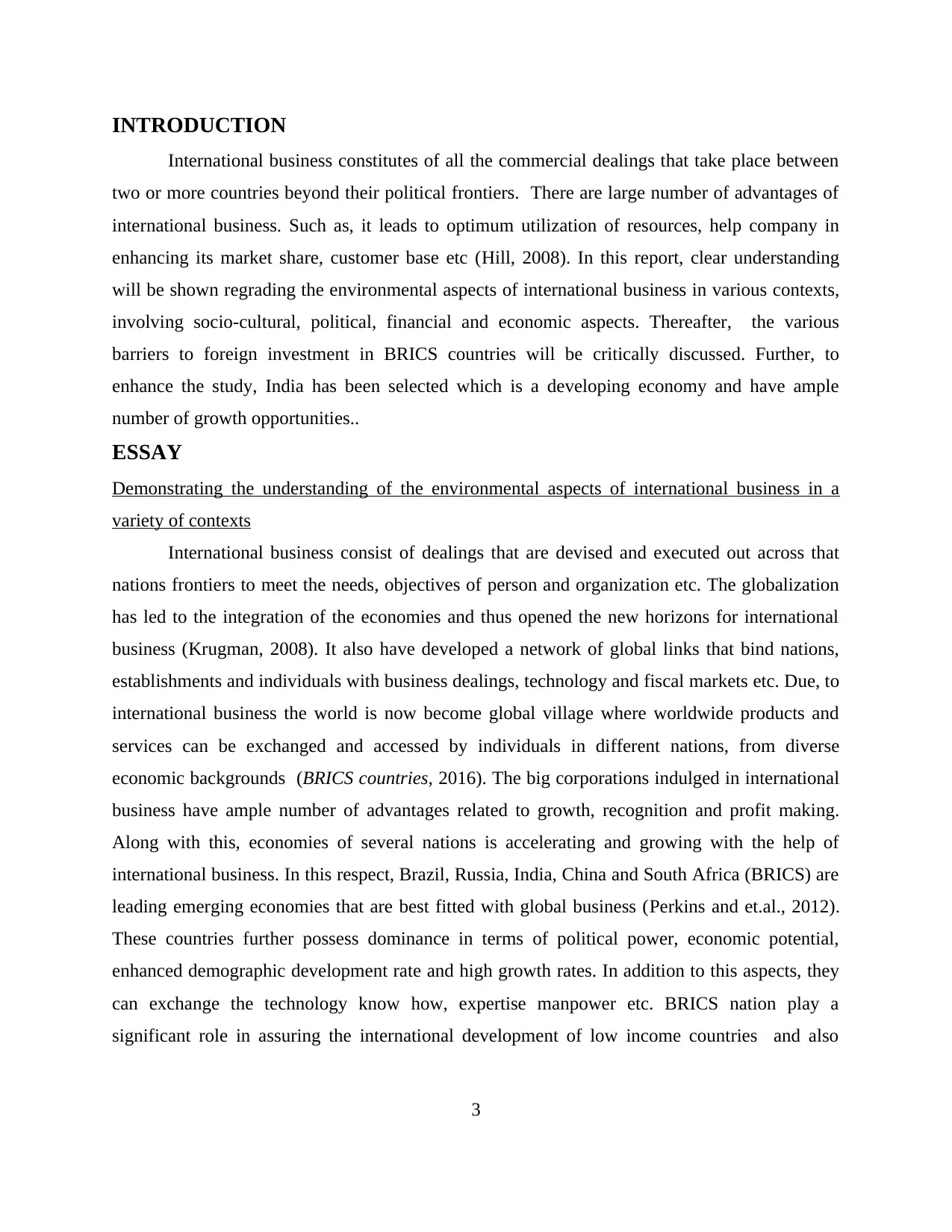
INTRODUCTION
International business constitutes of all the commercial dealings that take place between
two or more countries beyond their political frontiers. There are large number of advantages of
international business. Such as, it leads to optimum utilization of resources, help company in
enhancing its market share, customer base etc (Hill, 2008). In this report, clear understanding
will be shown regrading the environmental aspects of international business in various contexts,
involving socio-cultural, political, financial and economic aspects. Thereafter, the various
barriers to foreign investment in BRICS countries will be critically discussed. Further, to
enhance the study, India has been selected which is a developing economy and have ample
number of growth opportunities..
ESSAY
Demonstrating the understanding of the environmental aspects of international business in a
variety of contexts
International business consist of dealings that are devised and executed out across that
nations frontiers to meet the needs, objectives of person and organization etc. The globalization
has led to the integration of the economies and thus opened the new horizons for international
business (Krugman, 2008). It also have developed a network of global links that bind nations,
establishments and individuals with business dealings, technology and fiscal markets etc. Due, to
international business the world is now become global village where worldwide products and
services can be exchanged and accessed by individuals in different nations, from diverse
economic backgrounds (BRICS countries, 2016). The big corporations indulged in international
business have ample number of advantages related to growth, recognition and profit making.
Along with this, economies of several nations is accelerating and growing with the help of
international business. In this respect, Brazil, Russia, India, China and South Africa (BRICS) are
leading emerging economies that are best fitted with global business (Perkins and et.al., 2012).
These countries further possess dominance in terms of political power, economic potential,
enhanced demographic development rate and high growth rates. In addition to this aspects, they
can exchange the technology know how, expertise manpower etc. BRICS nation play a
significant role in assuring the international development of low income countries and also
3
International business constitutes of all the commercial dealings that take place between
two or more countries beyond their political frontiers. There are large number of advantages of
international business. Such as, it leads to optimum utilization of resources, help company in
enhancing its market share, customer base etc (Hill, 2008). In this report, clear understanding
will be shown regrading the environmental aspects of international business in various contexts,
involving socio-cultural, political, financial and economic aspects. Thereafter, the various
barriers to foreign investment in BRICS countries will be critically discussed. Further, to
enhance the study, India has been selected which is a developing economy and have ample
number of growth opportunities..
ESSAY
Demonstrating the understanding of the environmental aspects of international business in a
variety of contexts
International business consist of dealings that are devised and executed out across that
nations frontiers to meet the needs, objectives of person and organization etc. The globalization
has led to the integration of the economies and thus opened the new horizons for international
business (Krugman, 2008). It also have developed a network of global links that bind nations,
establishments and individuals with business dealings, technology and fiscal markets etc. Due, to
international business the world is now become global village where worldwide products and
services can be exchanged and accessed by individuals in different nations, from diverse
economic backgrounds (BRICS countries, 2016). The big corporations indulged in international
business have ample number of advantages related to growth, recognition and profit making.
Along with this, economies of several nations is accelerating and growing with the help of
international business. In this respect, Brazil, Russia, India, China and South Africa (BRICS) are
leading emerging economies that are best fitted with global business (Perkins and et.al., 2012).
These countries further possess dominance in terms of political power, economic potential,
enhanced demographic development rate and high growth rates. In addition to this aspects, they
can exchange the technology know how, expertise manpower etc. BRICS nation play a
significant role in assuring the international development of low income countries and also
3
⊘ This is a preview!⊘
Do you want full access?
Subscribe today to unlock all pages.

Trusted by 1+ million students worldwide
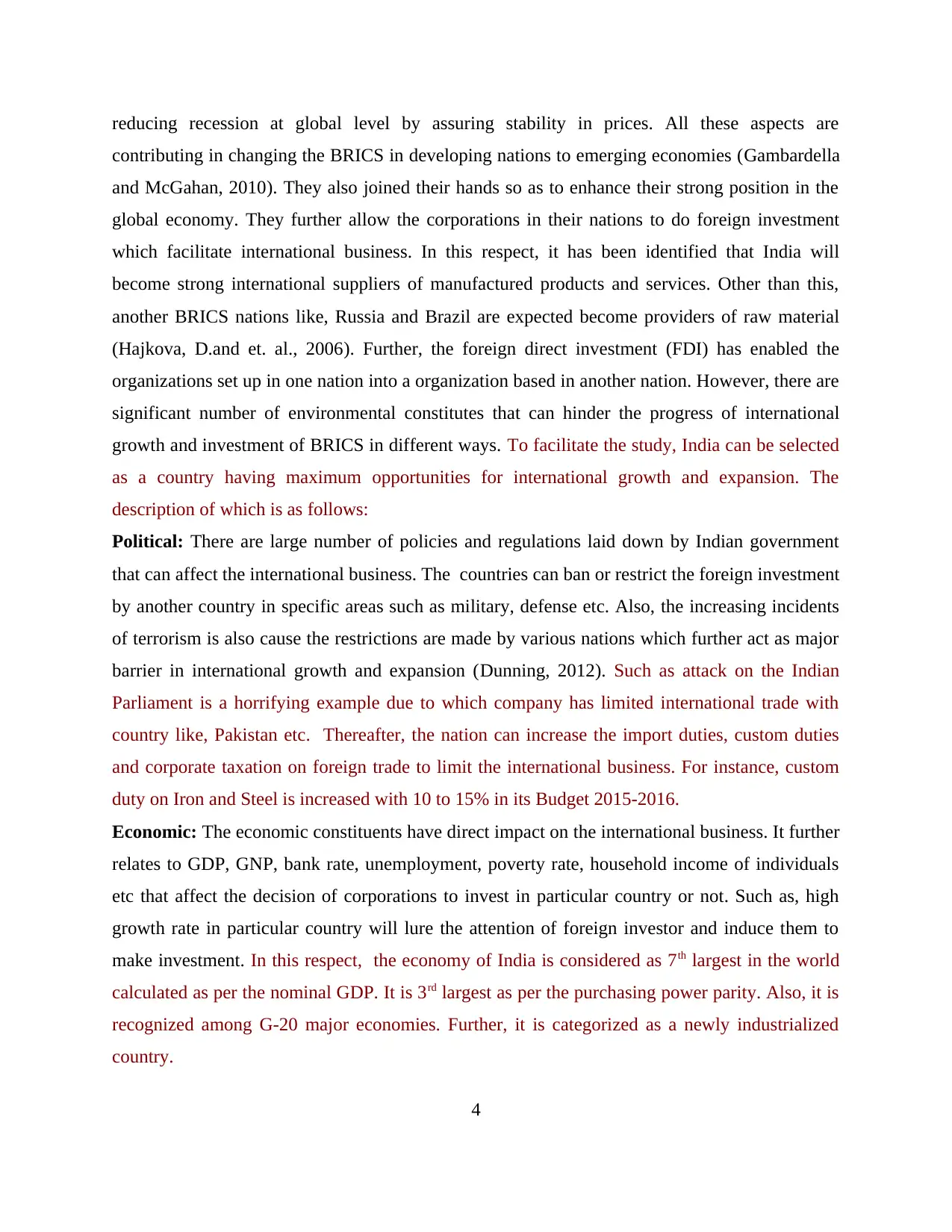
reducing recession at global level by assuring stability in prices. All these aspects are
contributing in changing the BRICS in developing nations to emerging economies (Gambardella
and McGahan, 2010). They also joined their hands so as to enhance their strong position in the
global economy. They further allow the corporations in their nations to do foreign investment
which facilitate international business. In this respect, it has been identified that India will
become strong international suppliers of manufactured products and services. Other than this,
another BRICS nations like, Russia and Brazil are expected become providers of raw material
(Hajkova, D.and et. al., 2006). Further, the foreign direct investment (FDI) has enabled the
organizations set up in one nation into a organization based in another nation. However, there are
significant number of environmental constitutes that can hinder the progress of international
growth and investment of BRICS in different ways. To facilitate the study, India can be selected
as a country having maximum opportunities for international growth and expansion. The
description of which is as follows:
Political: There are large number of policies and regulations laid down by Indian government
that can affect the international business. The countries can ban or restrict the foreign investment
by another country in specific areas such as military, defense etc. Also, the increasing incidents
of terrorism is also cause the restrictions are made by various nations which further act as major
barrier in international growth and expansion (Dunning, 2012). Such as attack on the Indian
Parliament is a horrifying example due to which company has limited international trade with
country like, Pakistan etc. Thereafter, the nation can increase the import duties, custom duties
and corporate taxation on foreign trade to limit the international business. For instance, custom
duty on Iron and Steel is increased with 10 to 15% in its Budget 2015-2016.
Economic: The economic constituents have direct impact on the international business. It further
relates to GDP, GNP, bank rate, unemployment, poverty rate, household income of individuals
etc that affect the decision of corporations to invest in particular country or not. Such as, high
growth rate in particular country will lure the attention of foreign investor and induce them to
make investment. In this respect, the economy of India is considered as 7th largest in the world
calculated as per the nominal GDP. It is 3rd largest as per the purchasing power parity. Also, it is
recognized among G-20 major economies. Further, it is categorized as a newly industrialized
country.
4
contributing in changing the BRICS in developing nations to emerging economies (Gambardella
and McGahan, 2010). They also joined their hands so as to enhance their strong position in the
global economy. They further allow the corporations in their nations to do foreign investment
which facilitate international business. In this respect, it has been identified that India will
become strong international suppliers of manufactured products and services. Other than this,
another BRICS nations like, Russia and Brazil are expected become providers of raw material
(Hajkova, D.and et. al., 2006). Further, the foreign direct investment (FDI) has enabled the
organizations set up in one nation into a organization based in another nation. However, there are
significant number of environmental constitutes that can hinder the progress of international
growth and investment of BRICS in different ways. To facilitate the study, India can be selected
as a country having maximum opportunities for international growth and expansion. The
description of which is as follows:
Political: There are large number of policies and regulations laid down by Indian government
that can affect the international business. The countries can ban or restrict the foreign investment
by another country in specific areas such as military, defense etc. Also, the increasing incidents
of terrorism is also cause the restrictions are made by various nations which further act as major
barrier in international growth and expansion (Dunning, 2012). Such as attack on the Indian
Parliament is a horrifying example due to which company has limited international trade with
country like, Pakistan etc. Thereafter, the nation can increase the import duties, custom duties
and corporate taxation on foreign trade to limit the international business. For instance, custom
duty on Iron and Steel is increased with 10 to 15% in its Budget 2015-2016.
Economic: The economic constituents have direct impact on the international business. It further
relates to GDP, GNP, bank rate, unemployment, poverty rate, household income of individuals
etc that affect the decision of corporations to invest in particular country or not. Such as, high
growth rate in particular country will lure the attention of foreign investor and induce them to
make investment. In this respect, the economy of India is considered as 7th largest in the world
calculated as per the nominal GDP. It is 3rd largest as per the purchasing power parity. Also, it is
recognized among G-20 major economies. Further, it is categorized as a newly industrialized
country.
4
Paraphrase This Document
Need a fresh take? Get an instant paraphrase of this document with our AI Paraphraser
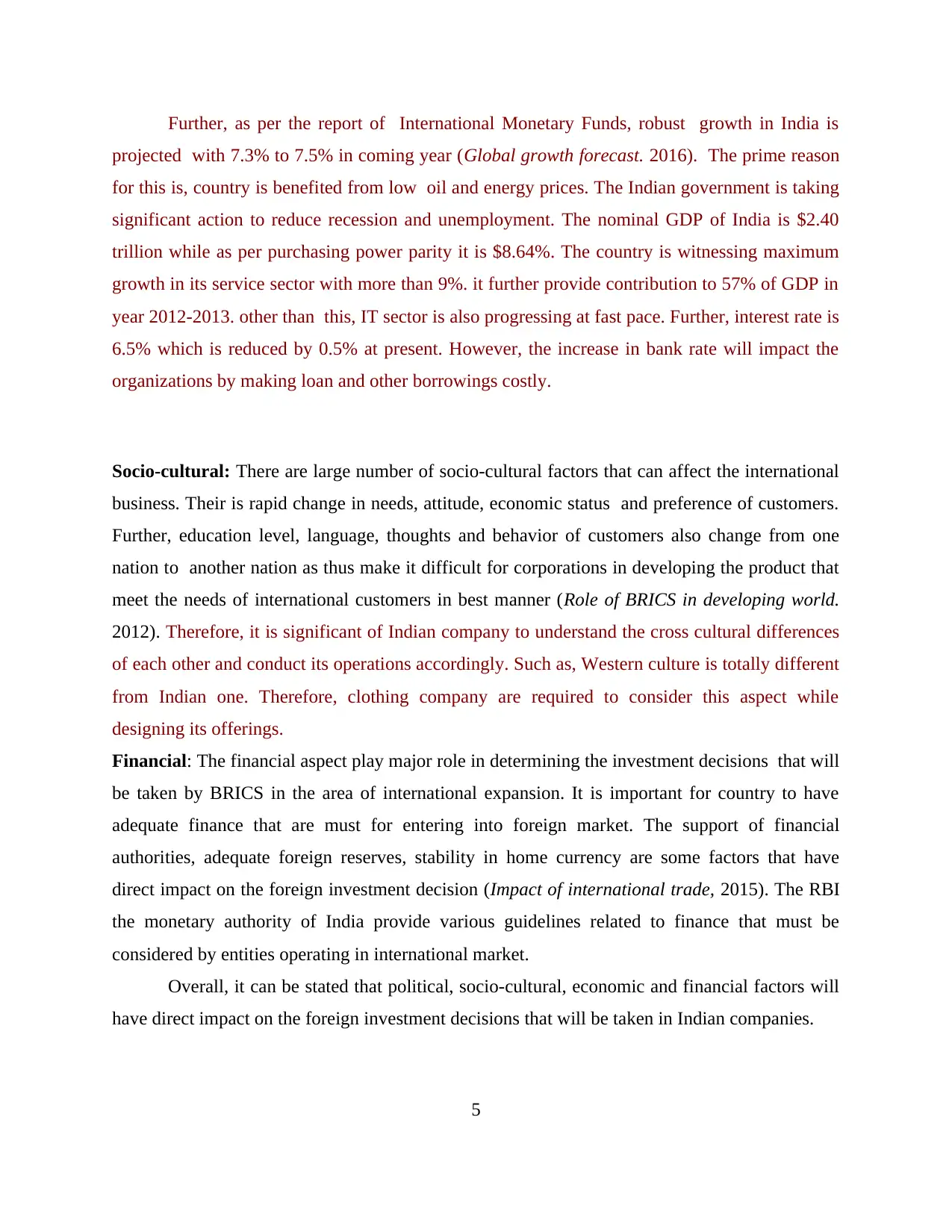
Further, as per the report of International Monetary Funds, robust growth in India is
projected with 7.3% to 7.5% in coming year (Global growth forecast. 2016). The prime reason
for this is, country is benefited from low oil and energy prices. The Indian government is taking
significant action to reduce recession and unemployment. The nominal GDP of India is $2.40
trillion while as per purchasing power parity it is $8.64%. The country is witnessing maximum
growth in its service sector with more than 9%. it further provide contribution to 57% of GDP in
year 2012-2013. other than this, IT sector is also progressing at fast pace. Further, interest rate is
6.5% which is reduced by 0.5% at present. However, the increase in bank rate will impact the
organizations by making loan and other borrowings costly.
Socio-cultural: There are large number of socio-cultural factors that can affect the international
business. Their is rapid change in needs, attitude, economic status and preference of customers.
Further, education level, language, thoughts and behavior of customers also change from one
nation to another nation as thus make it difficult for corporations in developing the product that
meet the needs of international customers in best manner (Role of BRICS in developing world.
2012). Therefore, it is significant of Indian company to understand the cross cultural differences
of each other and conduct its operations accordingly. Such as, Western culture is totally different
from Indian one. Therefore, clothing company are required to consider this aspect while
designing its offerings.
Financial: The financial aspect play major role in determining the investment decisions that will
be taken by BRICS in the area of international expansion. It is important for country to have
adequate finance that are must for entering into foreign market. The support of financial
authorities, adequate foreign reserves, stability in home currency are some factors that have
direct impact on the foreign investment decision (Impact of international trade, 2015). The RBI
the monetary authority of India provide various guidelines related to finance that must be
considered by entities operating in international market.
Overall, it can be stated that political, socio-cultural, economic and financial factors will
have direct impact on the foreign investment decisions that will be taken in Indian companies.
5
projected with 7.3% to 7.5% in coming year (Global growth forecast. 2016). The prime reason
for this is, country is benefited from low oil and energy prices. The Indian government is taking
significant action to reduce recession and unemployment. The nominal GDP of India is $2.40
trillion while as per purchasing power parity it is $8.64%. The country is witnessing maximum
growth in its service sector with more than 9%. it further provide contribution to 57% of GDP in
year 2012-2013. other than this, IT sector is also progressing at fast pace. Further, interest rate is
6.5% which is reduced by 0.5% at present. However, the increase in bank rate will impact the
organizations by making loan and other borrowings costly.
Socio-cultural: There are large number of socio-cultural factors that can affect the international
business. Their is rapid change in needs, attitude, economic status and preference of customers.
Further, education level, language, thoughts and behavior of customers also change from one
nation to another nation as thus make it difficult for corporations in developing the product that
meet the needs of international customers in best manner (Role of BRICS in developing world.
2012). Therefore, it is significant of Indian company to understand the cross cultural differences
of each other and conduct its operations accordingly. Such as, Western culture is totally different
from Indian one. Therefore, clothing company are required to consider this aspect while
designing its offerings.
Financial: The financial aspect play major role in determining the investment decisions that will
be taken by BRICS in the area of international expansion. It is important for country to have
adequate finance that are must for entering into foreign market. The support of financial
authorities, adequate foreign reserves, stability in home currency are some factors that have
direct impact on the foreign investment decision (Impact of international trade, 2015). The RBI
the monetary authority of India provide various guidelines related to finance that must be
considered by entities operating in international market.
Overall, it can be stated that political, socio-cultural, economic and financial factors will
have direct impact on the foreign investment decisions that will be taken in Indian companies.
5
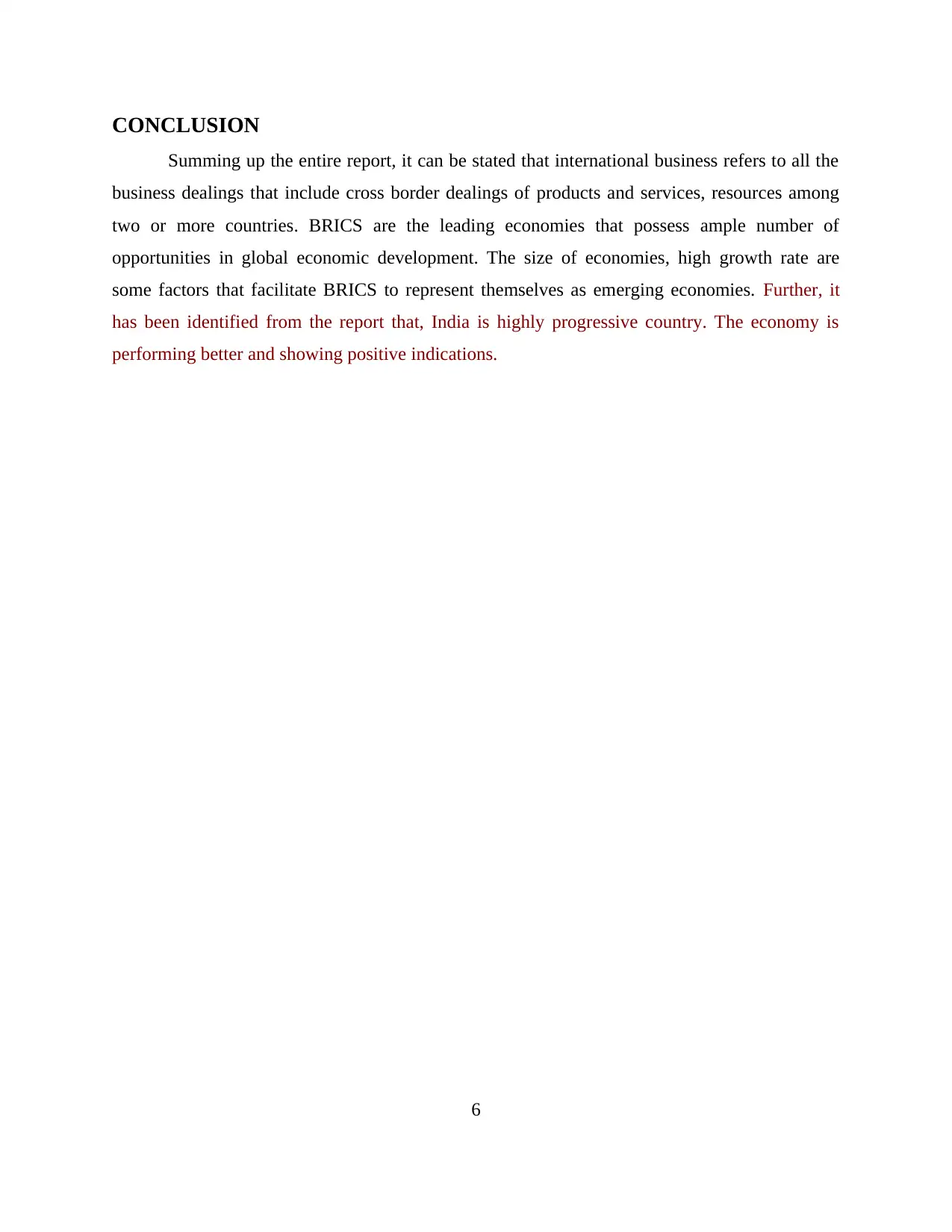
CONCLUSION
Summing up the entire report, it can be stated that international business refers to all the
business dealings that include cross border dealings of products and services, resources among
two or more countries. BRICS are the leading economies that possess ample number of
opportunities in global economic development. The size of economies, high growth rate are
some factors that facilitate BRICS to represent themselves as emerging economies. Further, it
has been identified from the report that, India is highly progressive country. The economy is
performing better and showing positive indications.
6
Summing up the entire report, it can be stated that international business refers to all the
business dealings that include cross border dealings of products and services, resources among
two or more countries. BRICS are the leading economies that possess ample number of
opportunities in global economic development. The size of economies, high growth rate are
some factors that facilitate BRICS to represent themselves as emerging economies. Further, it
has been identified from the report that, India is highly progressive country. The economy is
performing better and showing positive indications.
6
⊘ This is a preview!⊘
Do you want full access?
Subscribe today to unlock all pages.

Trusted by 1+ million students worldwide
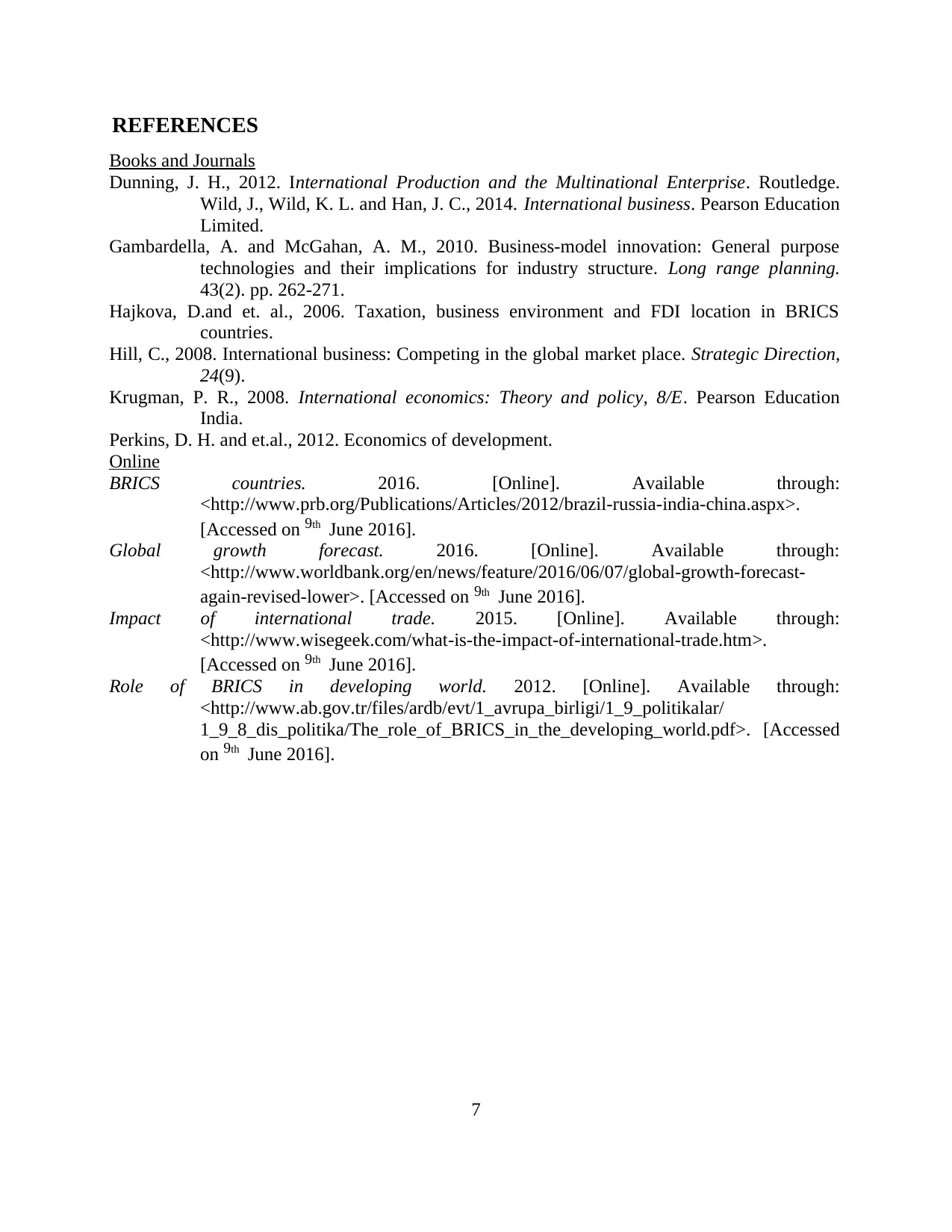
REFERENCES
Books and Journals
Dunning, J. H., 2012. International Production and the Multinational Enterprise. Routledge.
Wild, J., Wild, K. L. and Han, J. C., 2014. International business. Pearson Education
Limited.
Gambardella, A. and McGahan, A. M., 2010. Business-model innovation: General purpose
technologies and their implications for industry structure. Long range planning.
43(2). pp. 262-271.
Hajkova, D.and et. al., 2006. Taxation, business environment and FDI location in BRICS
countries.
Hill, C., 2008. International business: Competing in the global market place. Strategic Direction,
24(9).
Krugman, P. R., 2008. International economics: Theory and policy, 8/E. Pearson Education
India.
Perkins, D. H. and et.al., 2012. Economics of development.
Online
BRICS countries. 2016. [Online]. Available through:
<http://www.prb.org/Publications/Articles/2012/brazil-russia-india-china.aspx>.
[Accessed on 9th June 2016].
Global growth forecast. 2016. [Online]. Available through:
<http://www.worldbank.org/en/news/feature/2016/06/07/global-growth-forecast-
again-revised-lower>. [Accessed on 9th June 2016].
Impact of international trade. 2015. [Online]. Available through:
<http://www.wisegeek.com/what-is-the-impact-of-international-trade.htm>.
[Accessed on 9th June 2016].
Role of BRICS in developing world. 2012. [Online]. Available through:
<http://www.ab.gov.tr/files/ardb/evt/1_avrupa_birligi/1_9_politikalar/
1_9_8_dis_politika/The_role_of_BRICS_in_the_developing_world.pdf>. [Accessed
on 9th June 2016].
7
Books and Journals
Dunning, J. H., 2012. International Production and the Multinational Enterprise. Routledge.
Wild, J., Wild, K. L. and Han, J. C., 2014. International business. Pearson Education
Limited.
Gambardella, A. and McGahan, A. M., 2010. Business-model innovation: General purpose
technologies and their implications for industry structure. Long range planning.
43(2). pp. 262-271.
Hajkova, D.and et. al., 2006. Taxation, business environment and FDI location in BRICS
countries.
Hill, C., 2008. International business: Competing in the global market place. Strategic Direction,
24(9).
Krugman, P. R., 2008. International economics: Theory and policy, 8/E. Pearson Education
India.
Perkins, D. H. and et.al., 2012. Economics of development.
Online
BRICS countries. 2016. [Online]. Available through:
<http://www.prb.org/Publications/Articles/2012/brazil-russia-india-china.aspx>.
[Accessed on 9th June 2016].
Global growth forecast. 2016. [Online]. Available through:
<http://www.worldbank.org/en/news/feature/2016/06/07/global-growth-forecast-
again-revised-lower>. [Accessed on 9th June 2016].
Impact of international trade. 2015. [Online]. Available through:
<http://www.wisegeek.com/what-is-the-impact-of-international-trade.htm>.
[Accessed on 9th June 2016].
Role of BRICS in developing world. 2012. [Online]. Available through:
<http://www.ab.gov.tr/files/ardb/evt/1_avrupa_birligi/1_9_politikalar/
1_9_8_dis_politika/The_role_of_BRICS_in_the_developing_world.pdf>. [Accessed
on 9th June 2016].
7
1 out of 7
Related Documents
Your All-in-One AI-Powered Toolkit for Academic Success.
+13062052269
info@desklib.com
Available 24*7 on WhatsApp / Email
![[object Object]](/_next/static/media/star-bottom.7253800d.svg)
Unlock your academic potential
Copyright © 2020–2026 A2Z Services. All Rights Reserved. Developed and managed by ZUCOL.





